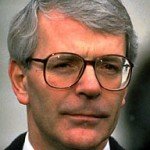 John Major (1943- ) was a British Conservative Party politician and prime minister of Britain between November 1990 and May 1997. Major was born in March 1943 on the southern fringe of London. His father Tom was a former music hall performer who manufactured and sold garden ornaments. Despite his father’s colourful past John Major had an uneventful childhood. He was a mediocre student who left school at age 16 after the family business failed, taking a procession of clerical and labouring jobs. Major moved into banking during the 1960s, joined the Conservative Party and participated in London council politics. He won a seat in the House of Commons in May 1979, in the same election that swept Margaret Thatcher to power. Major held various portfolios under Thatcher’s premiership including social security, treasury and foreign affairs. In October 1989 he was named Chancellor of the Exchequer.
John Major (1943- ) was a British Conservative Party politician and prime minister of Britain between November 1990 and May 1997. Major was born in March 1943 on the southern fringe of London. His father Tom was a former music hall performer who manufactured and sold garden ornaments. Despite his father’s colourful past John Major had an uneventful childhood. He was a mediocre student who left school at age 16 after the family business failed, taking a procession of clerical and labouring jobs. Major moved into banking during the 1960s, joined the Conservative Party and participated in London council politics. He won a seat in the House of Commons in May 1979, in the same election that swept Margaret Thatcher to power. Major held various portfolios under Thatcher’s premiership including social security, treasury and foreign affairs. In October 1989 he was named Chancellor of the Exchequer.
Major became Conservative Party leader and prime minister in November 1990, following Thatcher’s resignation. He named resolving the Troubles as a high priority, telling reporters “I always believed Northern Ireland should have been given a higher profile, that it was not acceptable to have any part of the UK engulfed in that sort of bloodshed and treated almost as though it was a matter of course”. Statements like this raised hopes of a negotiated peace in Northern Ireland. In December 1990, shortly after Major’s election, the Provisional IRA announced a three-day Christmas ceasefire. By early 1993 Major’s government was holding secret talks with Sinn Fein and the Provisional IRA – albeit while telling the parliament that dealing with the IRA would “turn my stomach”. Major threatened to abort these talks when the IRA bombed a Shankill Road fish shop in October, killing ten people.
In December 1993 Major and Irish taoiseach Albert Reynolds signed the Downing Street Declaration, one of the most important steps toward peace in Northern Ireland. The following year the Provisional IRA announced its ceasefire (August 1994) and Major responded by lifting Thatcher’s ban on the broadcasting of Sinn Fein or IRA leaders (September 1994). There were hiccups also. Unlike other stakeholders Major insisted that the Provisional IRA decommission its weapons before, rather than during, planned peace talks. This led to the IRA ending its ceasefire and detonating huge truck bombs in London and Manchester. These developments contributed to Major’s domestic unpopularity and he was defeated at election by the Tony Blair-led Labour Party in May 1997. Major remained in the House of Commons until 2001, after which he slipped into retirement.
© Alpha History 2017. Content on this page may not be republished or distributed without permission. For more information please refer to our Terms of Use.
This page was written by Rebekah Poole and Jennifer Llewellyn. To reference this page, use the following citation:
R. Poole & J. Llewellyn, “John Major”, Alpha History, accessed [today’s date], https://alphahistory.com/northernireland/john-major/.
